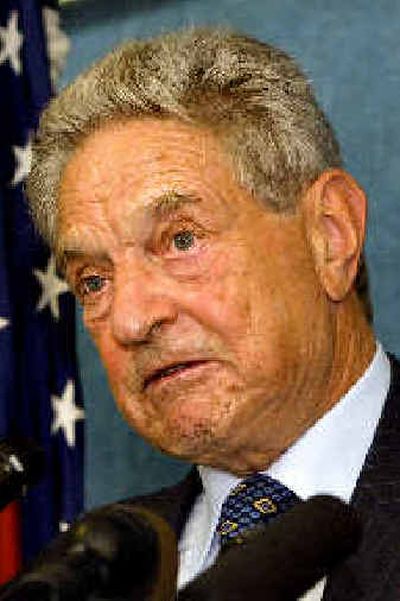Giving to partisan groups flourishing like never before

WASHINGTON – More wealthy donors are giving $1 million or more to partisan political organizations now than before a 2002 law took effect, aimed at removing big money from federal elections.
The top giver is George Soros, the billionaire financier who jump-started pro-Democratic efforts to find a way to keep spending the unlimited checks the Democratic Party can no longer collect. Soros, who has given roughly $24 million to various groups opposing President Bush, said he donated so much to these so-called 527s to help the Democrats compete financially with Republicans.
“I have to make the playing field more even,” Soros said in a telephone interview with the Associated Press, adding that he feels Bush is leading the country in the wrong direction. “I used the available legal means. I didn’t invent 527s. They were part of the law.”
About five dozen people are on the list of $1 million-plus donors to partisan groups active in this year’s presidential and congressional races.
That compares with about three dozen during the heyday of party “soft money” in the 2002 election cycle and about two dozen in 2000, according to data compiled by the Political Money Line campaign finance tracking service.
Such tax-exempt political groups began cropping up in larger numbers after a law took effect in November 2002 banning political parties from accepting soft money – corporate, union and unlimited contributions.
Some of those who wrote big checks in 2002 when national party committees and members of Congress could still accept them are giving even more now – this time to nonparty partisan groups running ads and get-out-the-vote campaigns.
One of the top donors on the Republican side, Dallas financier T. Boone Pickens, said he thinks 527s as they now exist should be abolished.
He said he didn’t donate to them until the leaders of two anti-Kerry groups approached him in early summer, after the Federal Election Commission rebuffed a push by the GOP and campaign watchdogs to limit the partisan groups’ fund raising.
“I saw what Soros was doing and I was somewhat surprised at some of the statements that he made. I felt they were pretty vicious statements about the president,” said Pickens, who gave roughly $5 million to the anti-Kerry groups after they approached him. “I was ready when they showed up, to put some money up.”
The flood of unlimited donations, despite a broad ban on the use of such soft money to influence federal races, has so alarmed the law’s supporters that they are making legislation to stop it a priority in the next Congress.
“We still have work to do,” said Rep. Martin Meehan, D-Mass., a lead House sponsor of the soft-money ban. Meehan and other supporters of the law are suing the Federal Election Commission for failing to rein in the partisan soft-money groups.
On the other hand, he said, the Supreme Court has paved the way for millionaires to spend large sums on politics.
The court long has held that individuals have a constitutional right to spend as much of their own money as they wish on political speech, such as airing political ads. But Meehan and other campaign finance watchdogs argue they do not necessarily have a right to give unlimited donations to partisan groups spending in federal elections.
This election cycle, wealthy individual donors have helped nonparty 527s double their fund raising overall, playing a bigger role in the finances of major groups than have the corporations and unions that used to give millions to the national party committees.
In all, tax-exempt, political groups registered with the IRS as 527s have raised more than $460 million in the 2003-04 election cycle, compared with about $221 million in 2001-2002, a Political Money Line analysis found.
Though prolific giving by Soros and other Democratic supporters started months before pro-Bush groups began aggressively raising big checks, the top-10 list of individual 527 donors is now split between Democrats and Republicans.
On the anti-Bush side, top donors besides Soros include Ohio businessman Peter Lewis, who has given at least $23 million, and Hollywood executive Stephen Bing, who has donated roughly $14 million.
Top donors to pro-Bush groups include Houston homebuilder Bob Perry, whose $8 million in giving includes donations to Swift Boat Veterans for Truth, whose TV ads accused John Kerry of lying about his decorated Vietnam War service.